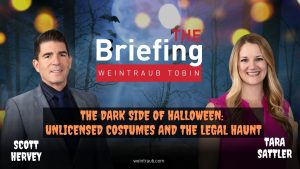
The Briefing by the IP Law Blog
Weintraub Tobin
The Dark Side of Halloween – Unlicensed Costumes and the Legal Haunt

The Dark Side of Halloween – Unlicensed Costumes and the Legal Haunt
Description
 Halloween is here, but beware! That killer costume might come with a lawsuit instead of candy. Scott Hervey and Tara Sattler discuss the legal threats associated with unlicensed costumes on this spooky episode of The Briefing.
Halloween is here, but beware! That killer costume might come with a lawsuit instead of candy. Scott Hervey and Tara Sattler discuss the legal threats associated with unlicensed costumes on this spooky episode of The Briefing.
Watch this episode on the Weintraub YouTube channel.
Show Notes:
Scott: With Halloween just around the corner, we’re diving into a Spooktacular topic. This is the dark side of Halloween, the side where you get a lawsuit instead of a Kit Kat bar. I’m Scott Hervey from the Entertainment and Media Group at the Law Firm of Weintraub Tobin, and I’m joined today by my partner, Tara Sattler. Today, we’re talking about how the unlicensed use of famous movie characters for Halloween costumes could lead to a copyright and trademark lawsuit. On this installment, the spooky installment of The Briefing.
Tara, thank you for joining me today. Oh, look, look, both of us have our Halloween-themed background here. How cute.
Tara: Thanks for having me, Scott, and for sharing the background. This is definitely a timely topic. It’s not It’s not all bobbing for apples when it comes to infringement claims.\
Scott: No, it certainly is not bobbing for apples when it comes to infringement claims. Every Halloween, people dress up as characters from their favorite movies or their TV shows, whether it’s superheroes, villains, cartoon characters, you name it. Let’s talk about how costumes, as these characters, could potentially be problematic.
Tara: Sure. The issue centers around intellectual property rights, both copyright and trademark. Movie studios and companies often hold copyrights over the characters and their distinctive designs, and they use trademarks to protect the names and logos associated with those characters. If you’re producing or selling costumes based on these characters without permission, you’re infringing on those rights.
Scott: Yeah, that’s right. The way a court will determine whether a character from an artistic work, like a movie or a television show or a comic book or a book is deserving of its own copyright protection. This is protection separate and apart from the artistic work in which that character is brought to life is by applying the character delineation test. This test is a legal standard that’s used to determine whether a fictional character is sufficiently developed and distinctive enough to qualify for copyright protection. Over the years, courts have applied this test in a variety of cases involving iconic characters. This includes Godzilla, the Batmobile, James Bond, and Rocky Balboa. This means that if you take elements from these kinds of iconic characters, whether it’s their physical look, a vehicle, or even their specific costume, and start selling them as part of a Halloween costume set without a license, you could be infringing both copyright and trademark rights.
Tara: Let’s talk about how this could apply to, let’s say, someone selling a Joker costume without DC comics permission.
Scott: Sure. Yeah, absolutely. I mean, the Joker is a heavily protected character under both copyright and trademark law. Anyone selling costumes based on the Joker’s likeness without a proper license would face a copyright infringement lawsuit because that costume would be considered a derivative work derived from the Joker character. The court would apply the character delineation test, and they would certainly find that the Joker character is sufficiently developed and distinctive enough to qualify for its own copyright protection. So aside from the copyright issue, there’s also the trademark issue, and the same goes for the use of the trademarks like the Batman logo or the name Joker. The unlicensed use of these elements could also cause consumer confusion. People might think that the costumes are officially sanctioned by DC comics when they’re not.
Tara: So if you’re selling or even just marketing Halloween costumes with logos or designs that are close If it comes enough to the original, a company could claim that you’re infringing their trademark and you might be on the hook for damages.
Scott: That’s definitely something for people to think about before grabbing their favorite superhero costume. But time for a reality check. People who just want to dress up as their favorite characters for fun are really not going to be facing a lawsuit.
Tara: I think you’re right. In all likelihood, probably not. For personal use, like wearing a costume to a Halloween party or around your neighborhood, you’re generally not not going to get sued. The issue really arises when someone starts selling or mass-producing unlicensed costumes. Personal use falls more within the realm of fair use, where there’s no commercial gain involved. But once he enters the picture, that’s when legal troubles can begin.
Scott: No, that’s right, Tara. I agree with you 100%. So thanks for joining me today on this spooktacular episode of The Briefing, Tara. Happy Halloween.
Tara: It was my pleasure. Thanks, Scott. Happy Halloween to you and everyone else.
Scott: Well, that’s all for this spooky edition of The Briefing. Thanks to Tara Sattler for joining me today. And thank you, the listener or viewer, for tuning in. We hope you found this episode informative and enjoyable. And if you did, please remember to subscribe, leave us a review, and share this episode with your friends and colleagues. If you have any questions about the topics we covered today, please leave us a comment.